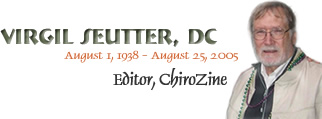Commentary
Commentaries are provided to either 1) clarify an article or an issue contained within that article or 2) to editorialize on topics of concern to the profession.Article Contribution: Articles are always welcome for either the ChiroZine or the Clinician's Review. We are always looking for educational material that may contribute insight into chiropractic and the theoretical and research findings.
 |
 Commentary: How does neuroethics translate into neurophilosophy? And where does chiropractic philosophy fit in? Virgil Seutter, D.C., editor, ChiroZine. Neuroscience has made remarkable advances in recent months. The Human Genome Project and the advances in stem cell research have created questions in the realm of neuroethics distinctly different from bioethics; the former challenging the autonomy of mind/body relationships and basic freedoms of choice in destiny as confrontational to causal determinism whereas the latter is content to moralize on the appropriateness of intervention, but without the proprietary obligations of mind/body relationships in which causal determinism is viewed as an arbitrary ethic reserved to reducible outcomes. The idea that any discussion on The Ethics of Neuroscience cannot avoid examination of The Neuroscience of Ethics as a feedback loop of interactions in mind/body relationships is interesting. The possibility that the body feeds the mind and, conversely, that the mind feeds the body presents irreconcilable challenges to the field of ethics and to our idea of consciousness and who we are. Special conferences (1) to create dialogue and map the field of neuroethics (2) is emerging in the science community; it is, in essence, the beginnings of a developing neurophilosophy. Confusing the science community, however, is the appearance of Complementary and Alternative Medicine (CAM) on the scene. Science has been slow in recognizing that health care based upon CAM principles have been developed over a period of time through observation; that CAM views its protocol as 'evidence-based' through cultural reinforcement of observational data. It is consciousness fortified as empirical (ethics of neuroscience) reserving examination to disciplined models of care (neuroscience of ethics) as in acupuncture, chiropractic, massage, etc. The possibility of "Mapping Acupuncture onto Western Neuroscience" is not without consideration if one considers that acupuncture had developed within the ethics of prehistory; that the problem could be in "the way we view physical contact systems of health care such as acupuncture, chiropractic, or massage. These disciplines try to protect their autonomy as cultural systems of healing by defying reductionist inquiry, by encouraging instead a holistic viewpoint..." (3) In a sense, CAM was 'before its time,' that consciousness was the only observable evidence to an inquiring mind that considered the whole more important than the bits and pieces. The ethics of conscience was probably more accurate in developing a cultural fortification of the ritual protocol. While neuroscience is attempting to develop a philosophy to guide itself in the cultural implementations as ethical guidelines, the chiropractor has all along attempted to follow guidelines that could not be examined with rigor beyond the intellectual examination of its protocol. It would appear, now, that neuroscience must follow the same tactic to map its future course.
Virgil Seutter, D.C. Further Reading 1. Neuroethics for the new millenium by Adina Roskies, Neuron (bmn; 25 aug 2002)
2.
NEUROETHICS:
MAPPING THE FIELD May 13-14, 2002 The Self-Made
Brain Neuroscience in 2025 Jacob Waldbauer, in collaboration with
Michael Gazzaniga, Ph. (scbe.stanford.edu;pdf; fnd 25 aug 2002)
3. Seutter Virgil. Letter to the Editor: "Mapping Acupuncture Onto
Western Neuroscience"
Cerebrum.
2002;4:1;118-119. More MRI Studies Provide New Insight Into How Emotions Interfere With Staying Focused (sciencedaily; Duke University; fnd 25 aug 2002) |
 |
|
 |
 |